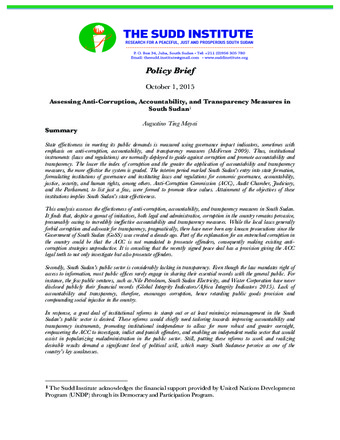Assessing Anti-Corruption, Accountability, and Transparency Measures in South Sudan
Publication Summary
State effectiveness in meeting its public demands is measured using governance impact indicators, sometimes with emphasis on anti-corruption, accountability, and transparency measures (McFerson 2009). Thus, institutional instruments (laws and regulations) are normally deployed to guide against corruption and promote accountability and transparency. The lower the index of corruption and the greater the application of accountability and transparency, the more effective the system is graded. The interim period marked South Sudan’s entry into state formation, formulating institutions of governance and instituting laws and regulations for economic governance, accountability, justice, security, and human rights, among others. Anti-Corruption Commission (ACC), Audit Chamber, Judiciary, and the Parliament, to list just a few, were formed to promote these values. Attainment of the objectives of these institutions implies South Sudan’s state effectiveness.
This analysis assesses the effectiveness of anti-corruption, accountability, and transparency measures in South Sudan. It finds that, despite a gamut of initiatives, both legal and administrative, corruption in South Sudan remains pervasive, presumably owing to incredibly ineffective accountability and transparency measures. While the local laws generally forbid corruption and advocate for transparency, pragmatically, there have never been any known prosecutions since the Government of South Sudan (GoSS) was created a decade ago. Part of the explanation for an entrenched corruption in the country could be that the ACC is not mandated to prosecute offenders, consequently making existing anti-corruption strategies unproductive. It is consoling to hear that the recent signed peace deal has a provision giving ACC legal teeth to not only investigate but also have prosecutorial powers.
Secondly, South Sudan’s public sector is considerably lacking in transparency. Even though the law mandates right of access to information, most public offices rarely engage in sharing their essential records with the general public. For instance, the few public ventures, such as Nile Petroleum, South Sudan Electricity, and Water Corporation have never disclosed publicly their financial records (Global Integrity Indicators/Africa Integrity Indicators 2015). Lack of accountability and transparency, therefore, encourages corruption, hence retarding public goods provision and compounding social injustice in the country.
In response, a great deal of institutional reforms to stamp out or at least minimize mismanagement in South Sudan’s public sector is desired. These reforms would chiefly need tailoring towards improving accountability and transparency instruments, promoting institutional independence to allow for more robust and greater oversight, empowering the ACC to investigate, indict and punish offenders, and enabling an independent media sector that would assist in popularizing maladministration in the public sector. Still, putting these reforms to work and realizing desirable results demand a significant level of political will, which many South Sudanese perceive as one of the country’s key weaknesses.
Augustino Ting Mayai's Biography
Augustino Ting Mayai is the former Managing Director of the Sudd Institute. He is a founding Research Director of the same institution, serving in this capacity for a decade. He holds a Ph.D. in Sociology, with concentrations on demography and development from the University of Wisconsin-Madison. He currently studies how state effectiveness affects child health outcomes in South Sudan and Ethiopia. Dr. Mayai has written extensively on South Sudan’s current affairs. August is the current Chair (Statistician General) of the National Bureau of Statistics, Government of South Sudan.

